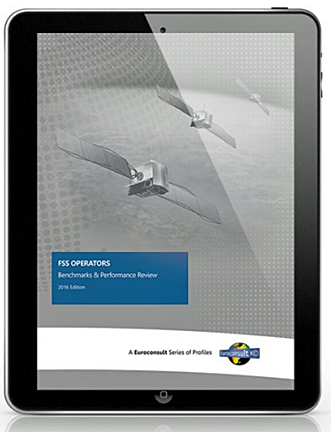
According to Euroconsult's newly-published report, FSS Operators: Benchmarks & Performance Review, FSS industry revenues declined by 7 percent in 2015 and have continued to deteriorate through the first half of 2016.
Headwinds in the FSS industry have raised significant cause for concern in the last year or so, as highlighted by the lower stock valuations of leading FSS operators and the bearish sentiment in the sector among the investment community.
"At the half-year mark of 2016, FSS revenues were falling by 4 percent year-over-year with 2/3 of operators reporting lower revenues and global FSS operators particularly impacted," said Dimitri Buchs, Senior Consultant at Euroconsult and editor of the report. "Intelsat, SES and Eutelsat are all forecasting a decrease in revenues in FY2016 in their financial guidance." The impact on pricing has accelerated in recent months, especially in data-driven markets, where pressure from HTS systems and terrestrial networks is highest. This is set to lead to lower operating margins, forcing the industry to adapt to a new environment where satellite operators have no choice but to lower their pricing and increase their commercial flexibility."

A more positive outlook for the FSS industry is foreseen after 2017 as players are expected to have progressively adapted their strategy to a changing landscape. The overall market direction is towards greater satellite cost-effectiveness through larger payloads, lower launch costs and other cost-optimization options offered by recent innovations. In the coming years the increasing competitiveness of satellite infrastructure, with HTS benefiting from a much lower break-even point than regular payloads, should allow operators to maintain decent return on investment despite lower pricing. The number of FSS operators providing HTS capacity is expected to grow to 25 by the end of 2019; this implies that half of FSS operators will still not have any available HTS capacity in-orbit in 2019.
Different from its sister report, Satellite Communications & Broadcasting Markets Survey, which provides analysis and forecasts of the overall FSS industry using a consolidated approach, FSS Operators: Benchmarks & Performance Review focuses on the individual performance of each FSS operator. In this year's edition, Euroconsult has expanded the benchmark analysis with new performance indicators to provide a better view of the competitive positioning of each FSS operator.
Based on our industry benchmark, the average FSS operator in 2015 had $276 million in revenue; 170 transponders leased of which 58 percent were used for video applications; 221 regular transponders and 12 Gbps of HTS capacity available for lease; 883 TV channels including 190 HD channels and four DTH payTV platforms broadcast over satellite; six satellites on orbit with an average fleet age of seven years; one satellite with an HTS payload; and two satellites under construction.
Other report findings include:
- In 2015, the FSS industry counted 42 revenue-generating FSS operators; up to 15 new operators should enter the market by the early 2020s, most of them backed by governments
- 21 operators had revenue of more than $100 million, representing 93 percent of all FSS operator revenues
- 45 percent of FSS operators increased the number or regular transponders leased throughout 2015
- 12 operators had fill rates of 80 percent or more, seven of which had fill rates of 90 percent or more
- Nearly 40,000 TV channels and more than 150 DTH pay-TV platforms were broadcast by satellite
- 11 operators distributed UHD channels in 2015. Three additional operators have begun to distribute UHD content in 2016, including Telesat

